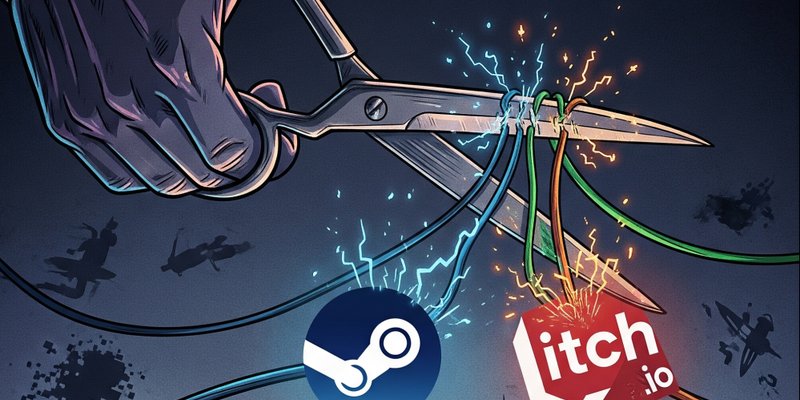If you logged onto Steam or Itch.io recently, you might have noticed something strange. A whole swath of games, particularly those with adult themes, just… vanished. Delisted from Steam, deindexed on Itch.io. Your first thought might be that the platforms had a sudden moral awakening. But the real story is a lot more complicated and, honestly, way more concerning. This wasn't a top-down decision from the platforms themselves; it was a shot fired from the shadows, aimed directly at their wallets.
Let's get this straight: this is a story about financial deplatforming. Think of it like this: an activist group didn't like a book in a library, so instead of complaining to the librarian, they threatened to bulldoze the road leading to the library. That’s what just happened to two of PC gaming's biggest storefronts.
What the Heck Just Happened?
In mid-July 2025, things got weird. Seemingly overnight, Steam delisted over 150 games and DLCs. The official reason was a new, hilariously vague rule prohibiting, and I quote: “Content that may violate the rules and standards set forth by Steam’s payment processors.” This is corporate doublespeak for "we don't even know what the rule is, but we're terrified of breaking it." For developers, it’s like being told not to misbehave without ever being told the rules.
Days later, Itch.io, the beloved home for weird, experimental, and queer indie games, followed suit. They didn't delete the games, but they did something almost as bad: they “deindexed” all NSFW content. Imagine your game is a book in a massive library. Deindexing is like ripping out its card from the card catalog. The book is still on a shelf somewhere, but unless a reader knows exactly where to look, they will never find it. For developers who rely on discovery to make a living, this was a death sentence.
Follow the Money: The Real Villains of the Story
So, why the sudden panic? The platforms weren't the ones who woke up and chose chaos. The catalyst was a targeted campaign by an Australian group called Collective Shout, an anti-pornography organization that decided to play hardball.
Their strategy was deviously simple and brutally effective. They didn't waste time writing angry letters to Valve or Itch.io. Instead, they went straight for the jugular: the payment processors. We're talking about the big guns, like Visa and Mastercard. Collective Shout sent them open letters accusing the platforms of profiting from obscene content. The processors, being massive corporations that hate risk and controversy, got spooked.
Here’s the breakdown: platforms like Steam and Itch.io are nothing without the ability to process payments. They are, at their core, stores. If Visa and Mastercard pull their services, the entire business model collapses. It’s like being a restaurant that’s suddenly banned from accepting money. Faced with this existential threat, both platforms had no choice but to comply. This is financial deplatforming in action, and it’s a terrifyingly effective tool for censorship.
The Fallout: Developers Caught in the Crossfire
The immediate result for developers was, unsurprisingly, a financial bloodbath. Discoverability is the lifeblood of an indie developer, and this move completely severed it. But the damage goes far deeper than just lost sales.
The vagueness of Steam's new rule has created a chilling effect. Developers are now second-guessing every creative decision. Is a romance scene too spicy? Is a political theme too controversial? When the lines are invisible, everyone plays it safe. This leads to self-censorship, and the entire creative landscape becomes a little more beige.
A Slippery Slope to Broader Censorship
Many in the community are calling this a "slippery slope," and they're not wrong. Today, the target is explicit adult games. But who’s next? The same tactics could easily be used to target games with queer characters, controversial political commentary, or anything an activist group decides is "unacceptable." The precedent has been set: if you can pressure the money, you can control the content.
This has hit the Itch.io community particularly hard. It was a sanctuary for marginalized creators, especially queer and trans developers. The Transfeminine Review noted the deindexing was “sloppy, haphazard, and entirely incoherent,” catching all sorts of content in its net. For these creators, it wasn't just about losing a storefront; it was about losing a home.
So, Where Do Adult Games Go From Here?
The hunt for an alternative is on, but the path is rocky. The core problem won’t go away. Any new platform that gets big enough to matter will eventually need to use the same major payment processors, making it vulnerable to the exact same pressure campaign. It's a digital Catch-22.
For now, developers are left with few options. They can host games on their own websites, which requires a ton of extra work in marketing and infrastructure. Or they can share direct links to their deindexed pages, relying on their existing fanbase for support. It’s a tough situation with no easy answers.
This whole mess is a stark reminder of how fragile creative freedom on the internet can be. It’s not just about whether you can buy a horny visual novel. It’s about who holds the power to decide what art is allowed, and whether your bank should get a vote. The fight for the future of indie games just got a whole lot more complicated.




